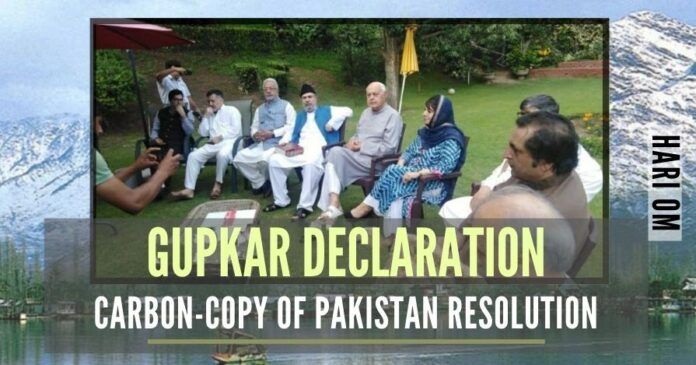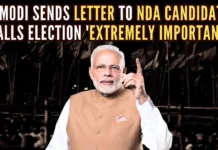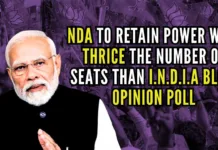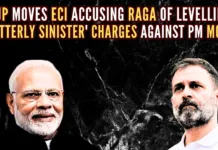
Jammu has to puncture the Gupkar Declaration and adopt the Jammu Declaration
J&K acceded to India in October 1947 under the Indian Independence Act. The immediate fallout was the transfer of political power from Jammu to Kashmir in a surreptitious manner. It happened after 101 years. Jammu was colonized with one stroke of a pen. Ladakh, which had been part of Dogra Kingdom even before the merger of tiny Kashmir with the mighty and benevolent Dogra Kingdom in March 1846, also became Kashmir’s other colony. Kashmir’s ruling elite was backed to the hilt by the UK-installed Government of India. It meticulously evolved and enforced ruthlessly policies which were calculated to making Kashmir’s majority community the sole factor in the state’s political situation, enriching Kashmir’s economy like London enriched the pauper UK’s economy by fleecing, draining and exploiting India, looting her natural resources and sending from India raw materials to Manchester, Lancashire and other UK cities and eroding the distinct identities and personalities of socially and culturally rich and exceptionally tolerant and all-accommodating Jammu and Ladakh.
Between 1947 and 1965, it was the Kashmir-based sectarian and fundamentally separatist National Conference (NC), which functioned in J&K like the British India Company functioned in the rest of India between 1600 and 1858. Between 1965 and 1975, it was the UK-founded and Kashmir-controlled Congress, which carried forward the policies of the NC. The objective was the same. No difference for obvious reasons. The most notable one was that the NC leaders, barring Sheikh Abdullah, Mirza Afzal Beg, and a few others, became Congress leaders overnight in 1965.
The Jammu-based leaders remained mum in 1947 when Jammu and Ladakh were converted into Kashmir’s colonies. They remained mum in 1949 when separatist Article 370 was adopted by the Indian Constituent Assembly.
That year, the Congress opened its chapter in J&K with NC leaders occupying all the positions in the government and in the Congress party. It was NC for all practical purposes. Between 1975 and 1984, the NC ruled the roost, further made the life of Jammu and Ladakh miserable, and created serious problems for India in the sensitive border state. Between 1984 and 1986, the NC’s son-in-law, GM Shah, and the Congress played the shots to hurt India and jeopardize the interests of Jammu and Ladakh. Between 1987 and January 19, 1990, and October 1996 and November 2, 2002, it was again the NC, which remained at the helm of affairs. Between November 2002 and April 7, 2008, it was the newly-founded Kashmir-based People’s Democratic Party (PDP) and the Congress, which wreaked havoc. Between 2008 and 2014, it was the turn of the NC and the Congress to carry forward the policies formulated and implemented by JL Nehru and Sheikh Abdullah. They left no stone unturned to jeopardize the nation’s interests and render Jammu and Ladakh unreal and ineffective. And, between March 1, 2015, and June 19, 2018, pro-self-rule and votary of Indo-Pak joint control on J&K, Mufti Mohammad Sayeed, and BJP and Mehbooba Mufti and the BJP broke all the previous records. The Muftis were in a great hurry and the BJP was exceptionally pliable. It’s not a secret.
What I stated above is just one part of the two-part story of Kashmir’s total domination and hegemony over the state’s polity and economy and nation-building departments and institutions. The other part of the story was as abominable as it was dumbfounding and disturbing. The case in point is the role the Jammu-based leaders of all hues played during all these 72 years of the J&K’s accession to India. It was uninspiring; it was negative. They all played happily and willingly all the games the Kashmiri ruling elite wanted them to play. They behaved like the bulk of Congress leaders behaved at the national level between 1885, when the Congress was founded and 1947 when London transferred power to its own Congress. If the Congress leaders helped London to defeat and puncture the freedom movement across British India, the Jammu and Ladakh leaders, barring Pandit Prem Nath Dogra, Head Lama of Ladakh Koshuk Bakula and Pandit Tirlochan Dutt, danced to the tunes of the Kashmiri ruling elite leaving the people of these two regions high and dry.
The Jammu-based leaders remained mum in 1947 when Jammu and Ladakh were converted into Kashmir’s colonies. They remained mum in 1949 when separatist Article 370 was adopted by the Indian Constituent Assembly. They didn’t open their mouth in 1952 when JL Nehru held discussions with Sheikh Abdullah on the political future of J&K and Ladakh. They remained mum when, on May 14, 1954, JL Nehru applied the illegal and discriminatory Article 35A to J&K w.e.f. May 14, 1944. They remained mum in 1974, 1986, 2002, 2008, and 2015, when the Congress and the BJP entered into accords with the NC and the PDP over the heads of Jammu and Ladakh. In the Cabinet meetings and in the J&K Legislature, they, without mincing words, also sided with the Kashmir’s ruling elite. They acted as facilitators taking Jammu and Ladakh for a ride. While in Opposition, the BJP did on occasion make some noises but with no result. And, when the J&K BJP shared power for the first time with the PDP, it left behind even the Congress. It compromised its ideology, again and again, to keep the Muftis in good humour. The truth, in short, is that all or nearly all the law-makers from Jammu worked in tandem with the Kashmiri lawmakers belonging to all the political parties. The memories of what transpired in the J&K Assembly in 2007 under the Congress and the PDP and how all the law-makers, barring one or two, conducted are still too fresh to be forgotten. These still linger in our minds. A reference here to just two developments on the floor of the Assembly: First Private Member’s Bill on secularism and second Private Member’s Bill on National Flag was summarily defeated by the Congress, the PDP, the NC, the PDF, the CPI-M, and Kashmir-based sole independent MLA.
However, it was on November 21, 2018, five months after the imposition of the Governor’s Rule, that J&K witnessed developments, which cleared the cobwebs of confusion, if any, and established that all Kashmiri leaders, without any exception, were one as far as their stand on who must control the J&K Civil Secretariat was concerned. The PDP with 27 MLAs, the NC with 15 MLAs, and the Congress with 12 MLAs joined hands to form a coalition government in the state to “protect and promote further the Kashmir cause”. The BJP went several steps further to placate Kashmir. The 25-member BJP offered unconditional support to the Kashmir-based separatist-turned-politician Sajjad Lone. It’s a different story that the then Governor SP Malik acted very wisely, defeated all these moves, and dissolved the Assembly. Not one Jammu-based leader raised even his/her little finger against these anti-Jammu and anti-Ladakh and unsettling developments. They watched these developments as a mute spectator.
“Who has given them the mandate to speak on behalf of and for the whole state or who has given them the power of attorney to decide the fate of Jammu and Ladakh?
Gupkar Declaration much of a Lahore’s Pakistan Resolution
But the story of the negative role of the Jammu-based leaders didn’t end on November 21, 2018. They continued to tread the same old path till and after August 4, 2019. What happened that day? That day, 20 Kashmiri leaders belonging to the NC, the PDP, the Congress, the People’s Conference, the People’s Democratic Front, CPI-M, and other outfits met for hours at the Gupkar residence of Farooq Abdullah. They all were the followers of one particular religion and they all belonged to one particular sect. That day, they adopted what they called the “Gupkar Declaration”. It embodied three specific demands:
- “That all the parties would be united in their resolve to protect and defend identity, autonomy, and the special status of the JK State against all attacks and onslaughts whatsoever.”
- “That the modification, abrogation of articles 35A, 370, trifurcation of the State or unconstitutional delimitation would be an aggression against the people of Jammu, Kashmir, and Ladakh.”
- “That the parties participating in the meeting resolved to seek an audience with the President and Prime Minister of India and the leaders of other political parties to apprise them of the current situation and make an appeal to them to safeguard the legitimate interests of the people of State with regard to constitutional guarantees given to the State under the constitution of our country.”
The Gupkar Declaration is virtually a carbon-copy of the March 23, 1940, Lahore’s Pakistan Resolution. The last few days have seen the frustrated, defeated, deflated and desperate Farooq Abdullah and his son Omar Abdullah and Mehbooba Mufti reiterating again and again that Gupkar Declaration is their new battle-cry and watch-word and that they will retrieve what they lost on August 5, 2019.
Enough is enough. It must remain a matter of regret that no Jammu-based leader worth his/her name has till date taken on these Kashmir-centric and pro-semi-independence Kashmiri leaders. Not one Jammu-based leader has till date asked them: “Who has given them the mandate to speak on behalf of and for the whole state or who has given them the power of attorney to decide the fate of Jammu and Ladakh? Jammu-based leaders must sit up to discuss if they did justice to their own Jammu constituency. It’s a must. Things have changed. Any failure on their part to read the writing on the wall will be counter-productive and suicidal. They must adopt the Jammu Declaration to deflate the separatist Gupkar Declaration and the Declaration must read: “We resolve to fight out the votaries of autonomy, self-rule, and Pakistan. We resolve to rise above petty considerations, form a united front, and protect and advance further the Jammu’s cause and restore Jammu to its pristine glory. We resolve to send a delegation to Delhi to meet the Prime Minister and the Home Minister to tell them that Jammu will not accept anything short of separate Jammu State”. As for New Delhi, it has to treat Jammu like it treated Ladakh. It must remember that one of the best ways to defeat “Kashmir Jihad” is the separation of Jammu from Ladakh.
Note:
1. The views expressed here are those of the author and do not necessarily represent or reflect the views of PGurus.
- ‘Kashmir My core constituency’: Revisiting July 12, 2003 to understand politics, Omar Abdullah-style - March 15, 2024
- Total deviation from traditional approach: Seven takeaways from PM Modi’s March 7 Srinagar visit - March 9, 2024
- Status of political parties: Why is further J&K reorganization imperative? - March 1, 2024











Good attempt at re-writing history. To discredit Congress party, call it as having started as a branch of UK government and discredit the whole independence movement to which any of the current right wing parties or their predecessors gave no contribution as they couldn’t command the confidence and support of the people of the country who walked with Mahatma Gandhi and Nehru. This is an extension of the argument of people like Anantha Kumar Hegde, MP from Karnataka, who said a few months ago that the independence movement was a drama as Gandhi did not receive lathi hits. This article is an example of what conspiracy theories are all about. I always feel that Pakistan is a nation given to perpetual laying.
There are Pakistan created videos on utube that say that our PM is in house arrest and our army has usurped power through a coup. This article matches such videos lie for lie. It is not difficult to make baseless arguments look like truth and there will always be quite a number of people who fall for such arguments. I can make an argument that AO Hume who founded the Congress party with an aim to establish self-rule as well as Annie Besant were British agents as how else could you explain white people fighting for self-rule of Indians or social reforms in India. Doesn’t this make perfect sense? There is another argument that is popularly peddled by the right wing politicians that finds resonance in many people who don’t know or care about history. The British looted everything in India and as nothing was left for them to loot, they gave power to the Congress traitors and not the right wing parties like Hindu Mahasabha which had pre-independence provincial coalition governments with the Muslim League in Sindh and North West Frontier. This argument also looks highly probable right? But then no one asks as to why the British that wanted to divide India did not support parties like Hindu Mahasabha whose leaders thought of India as being two separate nations (one Hindu and another muslim) instead of Congress that talked of Hindu-Muslim unity that was not what the British wanted?
India had 550 kingdoms, many of which had their own culture, tradition, language and food habits. The kingdoms on which British had complete control became part of India easily but the kingdoms that the British had no control over had a chance of aligning with either India or Pakistan based on their geography. It seems British had sold Kashmir to Jammu’s Dogra king. This king signed, in 1947, a document with Indian representatives called the “Instrument of Accession” (IoC) based on which India was to provide External Affairs, Central Finance and defense to the Kingdom of Jammu and Kashmir. As India did not have a written constitution when IoC was signed, the king inserted a clause (section 5) in IoC expressly stating that no future constitution of India can alter any provision of IoC. Then India formed the Constituent Assembly to draft the Indian Constitution and Article 370 was added to it to reflect the letter and spirit of the provisions of IoC. Later J & K also formed a Constituent Assembly to draft their own constitution. The J & K Constituent Assembly completed its work of coming up with its own constitution and was disbanded in 1957. It was understood that any alteration to the status of Jammu and Kashmir from what was envisaged in IoC and mirrored by Article 370 could only be done by the J & K Constituent Assembly. It is not very clear as to how and when Article 370 came about to be considered as a temporary measure. It seems Nehru got Sheikh Abdulla to agree to this. When our government abrogated Article 370 last year, it is not clear if the descendants of the Maharaja of Kashmir could have approached the UN saying that the letter and spirit of IoC have been violated. Whatever it is, Indian must support the abrogation of Article 370 as we cannot give it to Pakistan or allow it to remain as an independent nation for reasons relating to strategic aspects of our country’s defense. As regards Ladakh, China claims that it was part of the Kingdom of Quing dynasty of China and its control passed over to the British in the 19th century. It is very difficult to argue about which land must belong to which country in a logical manner. Chinese may ask as to how people belonging to their race can be Indians as in the North-East. Finally, it is always about practical compromised that the neighboring should make for peaceful co-existence without unnecessary arguments and chest beating…